Yazhe Niu
From Perception to Punchline: Empowering VLM with the Art of In-the-wild Meme
Dec 31, 2025Abstract:Generating humorous memes is a challenging multimodal task that moves beyond direct image-to-caption supervision. It requires a nuanced reasoning over visual content, contextual cues, and subjective humor. To bridge this gap between visual perception and humorous punchline creation, we propose HUMOR}, a novel framework that guides VLMs through hierarchical reasoning and aligns them with group-wise human preferences. First, HUMOR employs a hierarchical, multi-path Chain-of-Thought (CoT): the model begins by identifying a template-level intent, then explores diverse reasoning paths under different contexts, and finally anchors onto a high-quality, context-specific path. This CoT supervision, which traces back from ground-truth captions, enhances reasoning diversity. We further analyze that this multi-path exploration with anchoring maintains a high expected humor quality, under the practical condition that high-quality paths retain significant probability mass. Second, to capture subjective humor, we train a pairwise reward model that operates within groups of memes sharing the same template. Following established theory, this approach ensures a consistent and robust proxy for human preference, even with subjective and noisy labels. The reward model then enables a group-wise reinforcement learning optimization, guaranteeing providing a theoretical guarantee for monotonic improvement within the trust region. Extensive experiments show that HUMOR empowers various VLMs with superior reasoning diversity, more reliable preference alignment, and higher overall meme quality. Beyond memes, our work presents a general training paradigm for open-ended, human-aligned multimodal generation, where success is guided by comparative judgment within coherent output group.
One Model for All Tasks: Leveraging Efficient World Models in Multi-Task Planning
Sep 09, 2025Abstract:In heterogeneous multi-task learning, tasks not only exhibit diverse observation and action spaces but also vary substantially in intrinsic difficulty. While conventional multi-task world models like UniZero excel in single-task settings, we find that when handling large-scale heterogeneous environments, gradient conflicts and the loss of model plasticity often constrain their sample and computational efficiency. In this work, we address these challenges from two perspectives: the single learning iteration and the overall learning process. First, we investigate the impact of key design spaces on extending UniZero to multi-task planning. We find that a Mixture-of-Experts (MoE) architecture provides the most substantial performance gains by mitigating gradient conflicts, leading to our proposed model, \textit{ScaleZero}. Second, to dynamically balance the computational load across the learning process, we introduce an online, LoRA-based \textit{dynamic parameter scaling} (DPS) strategy. This strategy progressively integrates LoRA adapters in response to task-specific progress, enabling adaptive knowledge retention and parameter expansion. Empirical evaluations on standard benchmarks such as Atari, DMControl (DMC), and Jericho demonstrate that ScaleZero, relying exclusively on online reinforcement learning with one model, attains performance on par with specialized single-task baselines. Furthermore, when augmented with our dynamic parameter scaling strategy, our method achieves competitive performance while requiring only 80\% of the single-task environment interaction steps. These findings underscore the potential of ScaleZero for effective large-scale multi-task learning. Our code is available at \textcolor{magenta}{https://github.com/opendilab/LightZero}.
SafeWork-R1: Coevolving Safety and Intelligence under the AI-45$^{\circ}$ Law
Jul 24, 2025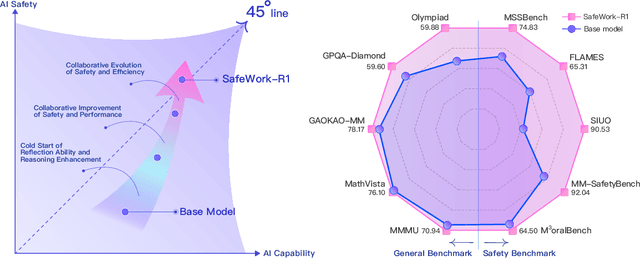
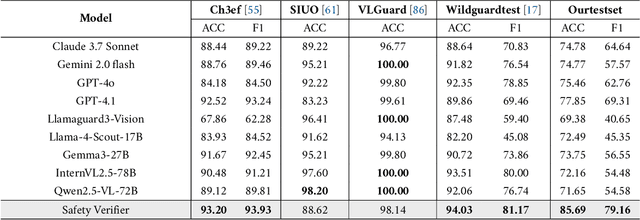
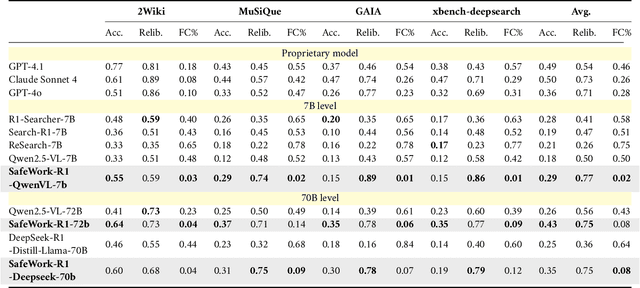

Abstract:We introduce SafeWork-R1, a cutting-edge multimodal reasoning model that demonstrates the coevolution of capabilities and safety. It is developed by our proposed SafeLadder framework, which incorporates large-scale, progressive, safety-oriented reinforcement learning post-training, supported by a suite of multi-principled verifiers. Unlike previous alignment methods such as RLHF that simply learn human preferences, SafeLadder enables SafeWork-R1 to develop intrinsic safety reasoning and self-reflection abilities, giving rise to safety `aha' moments. Notably, SafeWork-R1 achieves an average improvement of $46.54\%$ over its base model Qwen2.5-VL-72B on safety-related benchmarks without compromising general capabilities, and delivers state-of-the-art safety performance compared to leading proprietary models such as GPT-4.1 and Claude Opus 4. To further bolster its reliability, we implement two distinct inference-time intervention methods and a deliberative search mechanism, enforcing step-level verification. Finally, we further develop SafeWork-R1-InternVL3-78B, SafeWork-R1-DeepSeek-70B, and SafeWork-R1-Qwen2.5VL-7B. All resulting models demonstrate that safety and capability can co-evolve synergistically, highlighting the generalizability of our framework in building robust, reliable, and trustworthy general-purpose AI.
Let Androids Dream of Electric Sheep: A Human-like Image Implication Understanding and Reasoning Framework
May 22, 2025Abstract:Metaphorical comprehension in images remains a critical challenge for AI systems, as existing models struggle to grasp the nuanced cultural, emotional, and contextual implications embedded in visual content. While multimodal large language models (MLLMs) excel in basic Visual Question Answer (VQA) tasks, they struggle with a fundamental limitation on image implication tasks: contextual gaps that obscure the relationships between different visual elements and their abstract meanings. Inspired by the human cognitive process, we propose Let Androids Dream (LAD), a novel framework for image implication understanding and reasoning. LAD addresses contextual missing through the three-stage framework: (1) Perception: converting visual information into rich and multi-level textual representations, (2) Search: iteratively searching and integrating cross-domain knowledge to resolve ambiguity, and (3) Reasoning: generating context-alignment image implication via explicit reasoning. Our framework with the lightweight GPT-4o-mini model achieves SOTA performance compared to 15+ MLLMs on English image implication benchmark and a huge improvement on Chinese benchmark, performing comparable with the GPT-4o model on Multiple-Choice Question (MCQ) and outperforms 36.7% on Open-Style Question (OSQ). Additionally, our work provides new insights into how AI can more effectively interpret image implications, advancing the field of vision-language reasoning and human-AI interaction. Our project is publicly available at https://github.com/MING-ZCH/Let-Androids-Dream-of-Electric-Sheep.
Kimina-Prover Preview: Towards Large Formal Reasoning Models with Reinforcement Learning
Apr 15, 2025Abstract:We introduce Kimina-Prover Preview, a large language model that pioneers a novel reasoning-driven exploration paradigm for formal theorem proving, as showcased in this preview release. Trained with a large-scale reinforcement learning pipeline from Qwen2.5-72B, Kimina-Prover demonstrates strong performance in Lean 4 proof generation by employing a structured reasoning pattern we term \textit{formal reasoning pattern}. This approach allows the model to emulate human problem-solving strategies in Lean, iteratively generating and refining proof steps. Kimina-Prover sets a new state-of-the-art on the miniF2F benchmark, reaching 80.7% with pass@8192. Beyond improved benchmark performance, our work yields several key insights: (1) Kimina-Prover exhibits high sample efficiency, delivering strong results even with minimal sampling (pass@1) and scaling effectively with computational budget, stemming from its unique reasoning pattern and RL training; (2) we demonstrate clear performance scaling with model size, a trend previously unobserved for neural theorem provers in formal mathematics; (3) the learned reasoning style, distinct from traditional search algorithms, shows potential to bridge the gap between formal verification and informal mathematical intuition. We open source distilled versions with 1.5B and 7B parameters of Kimina-Prover
Empowering LLMs in Decision Games through Algorithmic Data Synthesis
Mar 18, 2025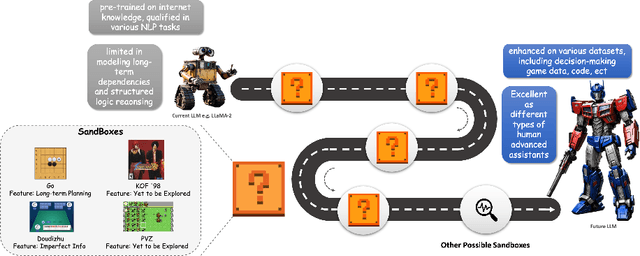

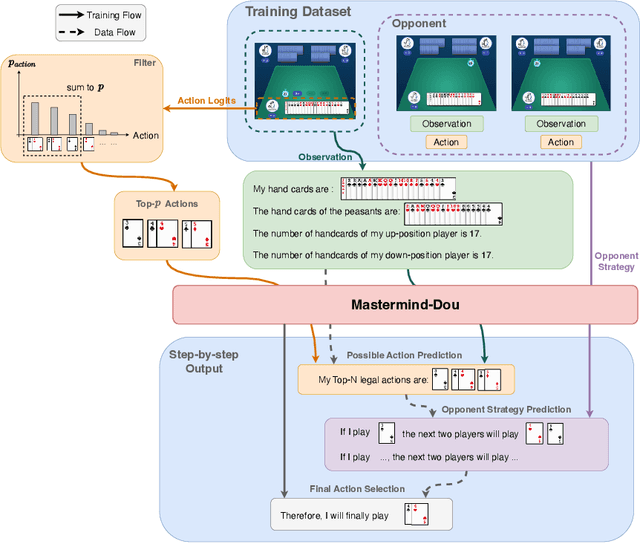

Abstract:Large Language Models (LLMs) have exhibited impressive capabilities across numerous domains, yet they often struggle with complex reasoning and decision-making tasks. Decision-making games, which inherently require multifaceted reasoning logic, serve as ideal sandboxes for evaluating and enhancing the reasoning abilities of LLMs. In this work, we first explore whether LLMs can master complex decision-making games through targeted post-training. To this end, we design data synthesis strategies and curate extensive offline datasets from two classic games, Doudizhu and Go. We further develop a suite of techniques to effectively incorporate this data into LLM training, resulting in two novel agents: Mastermind-Dou and Mastermind-Go. Our experimental results demonstrate that these Mastermind LLMs achieve competitive performance in their respective games. Additionally, we explore whether integrating decision-making data can enhance the general reasoning abilities of LLMs. Our findings suggest that such post-training improves certain aspects of reasoning, providing valuable insights for optimizing LLM data collection and synthesis strategies.
Hierarchical Balance Packing: Towards Efficient Supervised Fine-tuning for Long-Context LLM
Mar 10, 2025Abstract:Training Long-Context Large Language Models (LLMs) is challenging, as hybrid training with long-context and short-context data often leads to workload imbalances. Existing works mainly use data packing to alleviate this issue but fail to consider imbalanced attention computation and wasted communication overhead. This paper proposes Hierarchical Balance Packing (HBP), which designs a novel batch-construction method and training recipe to address those inefficiencies. In particular, the HBP constructs multi-level data packing groups, each optimized with a distinct packing length. It assigns training samples to their optimal groups and configures each group with the most effective settings, including sequential parallelism degree and gradient checkpointing configuration. To effectively utilize multi-level groups of data, we design a dynamic training pipeline specifically tailored to HBP, including curriculum learning, adaptive sequential parallelism, and stable loss. Our extensive experiments demonstrate that our method significantly reduces training time over multiple datasets and open-source models while maintaining strong performance. For the largest DeepSeek-V2 (236B) MOE model, our method speeds up the training by 2.4$\times$ with competitive performance.
Revisiting Generative Policies: A Simpler Reinforcement Learning Algorithmic Perspective
Dec 02, 2024Abstract:Generative models, particularly diffusion models, have achieved remarkable success in density estimation for multimodal data, drawing significant interest from the reinforcement learning (RL) community, especially in policy modeling in continuous action spaces. However, existing works exhibit significant variations in training schemes and RL optimization objectives, and some methods are only applicable to diffusion models. In this study, we compare and analyze various generative policy training and deployment techniques, identifying and validating effective designs for generative policy algorithms. Specifically, we revisit existing training objectives and classify them into two categories, each linked to a simpler approach. The first approach, Generative Model Policy Optimization (GMPO), employs a native advantage-weighted regression formulation as the training objective, which is significantly simpler than previous methods. The second approach, Generative Model Policy Gradient (GMPG), offers a numerically stable implementation of the native policy gradient method. We introduce a standardized experimental framework named GenerativeRL. Our experiments demonstrate that the proposed methods achieve state-of-the-art performance on various offline-RL datasets, offering a unified and practical guideline for training and deploying generative policies.
Pretrained Reversible Generation as Unsupervised Visual Representation Learning
Nov 29, 2024Abstract:Recent generative models based on score matching and flow matching have significantly advanced generation tasks, but their potential in discriminative tasks remains underexplored. Previous approaches, such as generative classifiers, have not fully leveraged the capabilities of these models for discriminative tasks due to their intricate designs. We propose Pretrained Reversible Generation (PRG), which extracts unsupervised representations by reversing the generative process of a pretrained continuous flow model. PRG effectively reuses unsupervised generative models, leveraging their high capacity to serve as robust and generalizable feature extractors for downstream tasks. Our method consistently outperforms prior approaches across multiple benchmarks, achieving state-of-the-art performance among generative model-based methods, including 78\% top-1 accuracy on ImageNet. Extensive ablation studies further validate the effectiveness of our approach.
PsyDI: Towards a Personalized and Progressively In-depth Chatbot for Psychological Measurements
Jul 22, 2024Abstract:In the field of psychology, the static nature and lack of customization of psychological test scales, along with the challenge of quantifying psychological indicators, have long been critical issues. Despite numerous attempts to use AI to address psychological challenges, a dynamically interactive psychological test has yet to emerge. In contrast to traditional psychological assessment methods, we propose PsyDI, a multi-modal, interactive, and customized chatbot for psychological assessments, using the Myers-Briggs Type Indicator (MBTI) as an example. PsyDI initiates with user-related multi-modal information, then engaging in customized interaction to discern the user's MBTI type based on their multiple rounds of responses. Despite these advancements, accurately quantifying absolute value of psychological indicators remains challenging. To tackle such difficulty, we introduce the PsyDI framework that trains LLMs to discern the relative magnitude of psychological traits rather than their absolute values. Through various experiments, we demonstrate the effectiveness of the training techniques proposed in PsyDI on various datasets, and we have also launched its web version, reaching about ~3k accesses. Additionally, comprehensive post-deployment data analysis has provided profound insights into the implications and applications of PsyDI, demonstrating its potential to serve as a general framework for psychological assessment.
 Add to Chrome
Add to Chrome Add to Firefox
Add to Firefox Add to Edge
Add to Edge